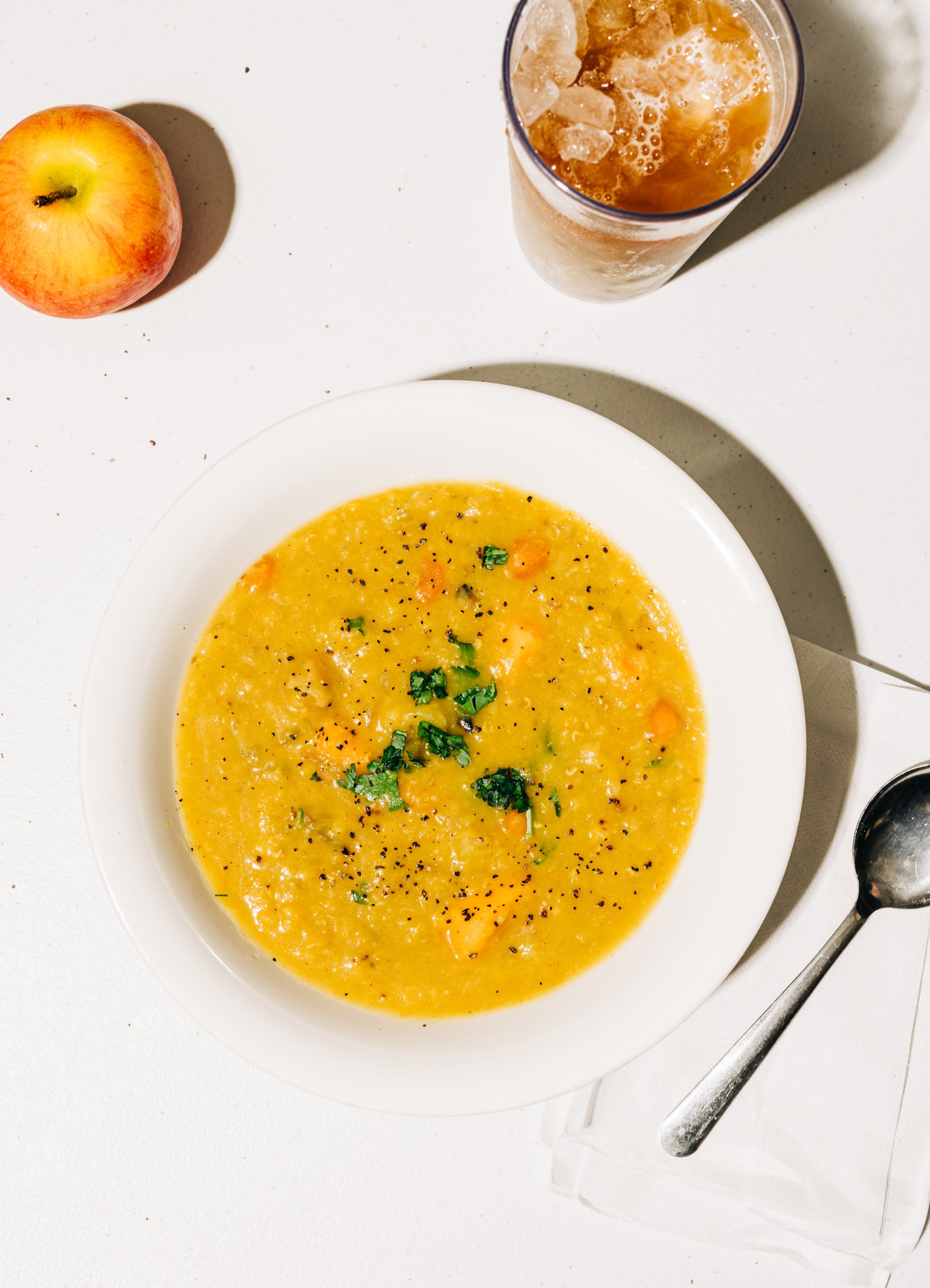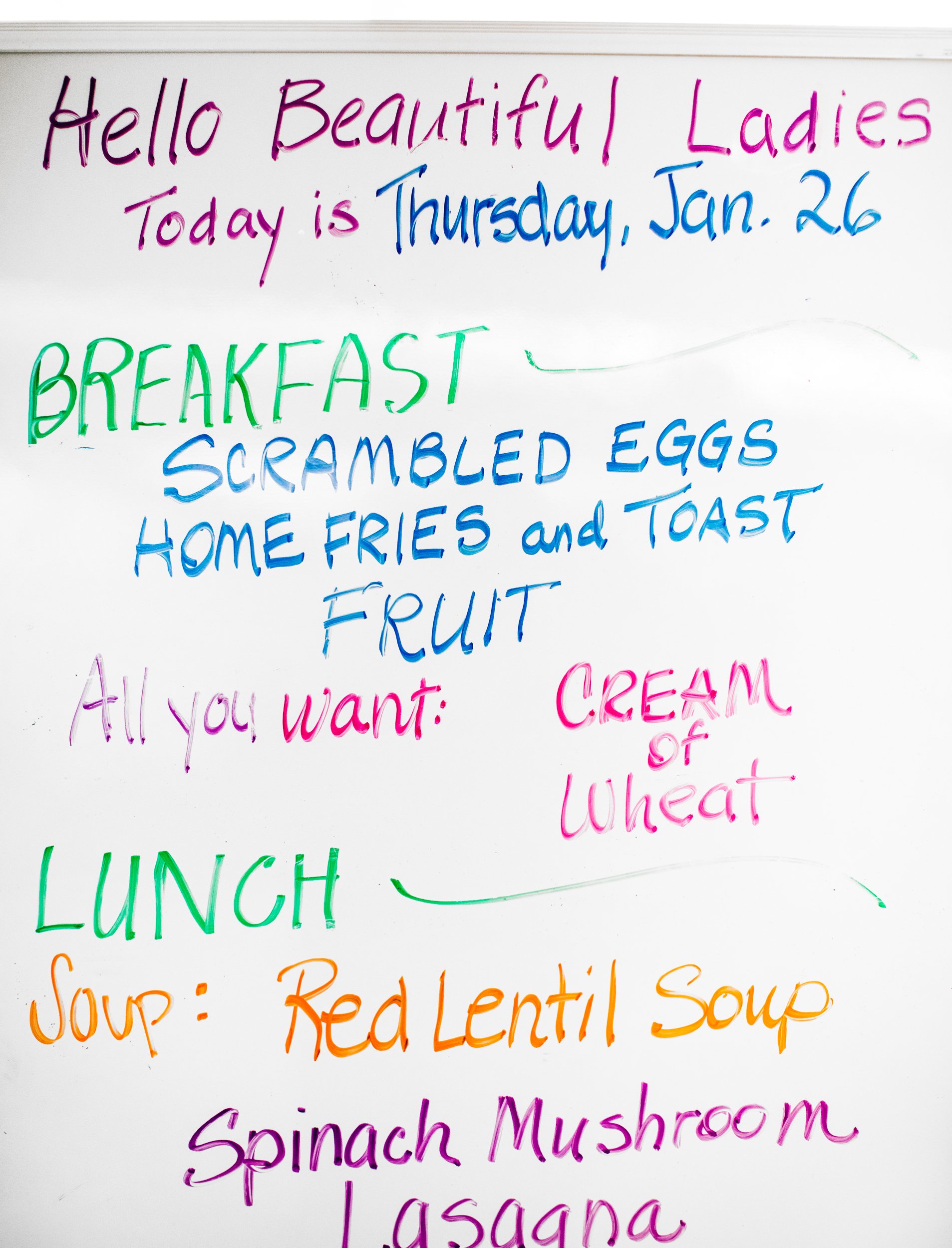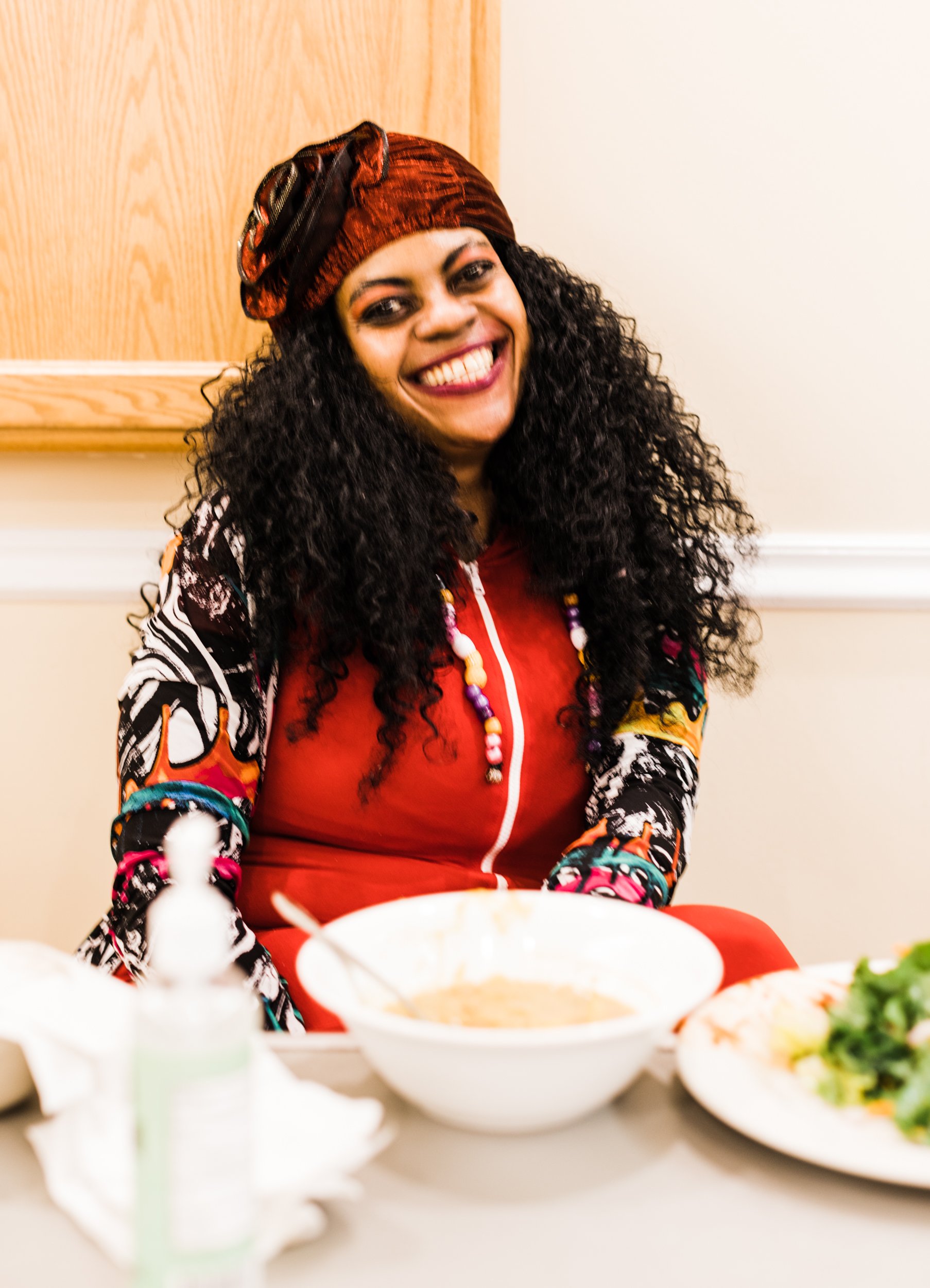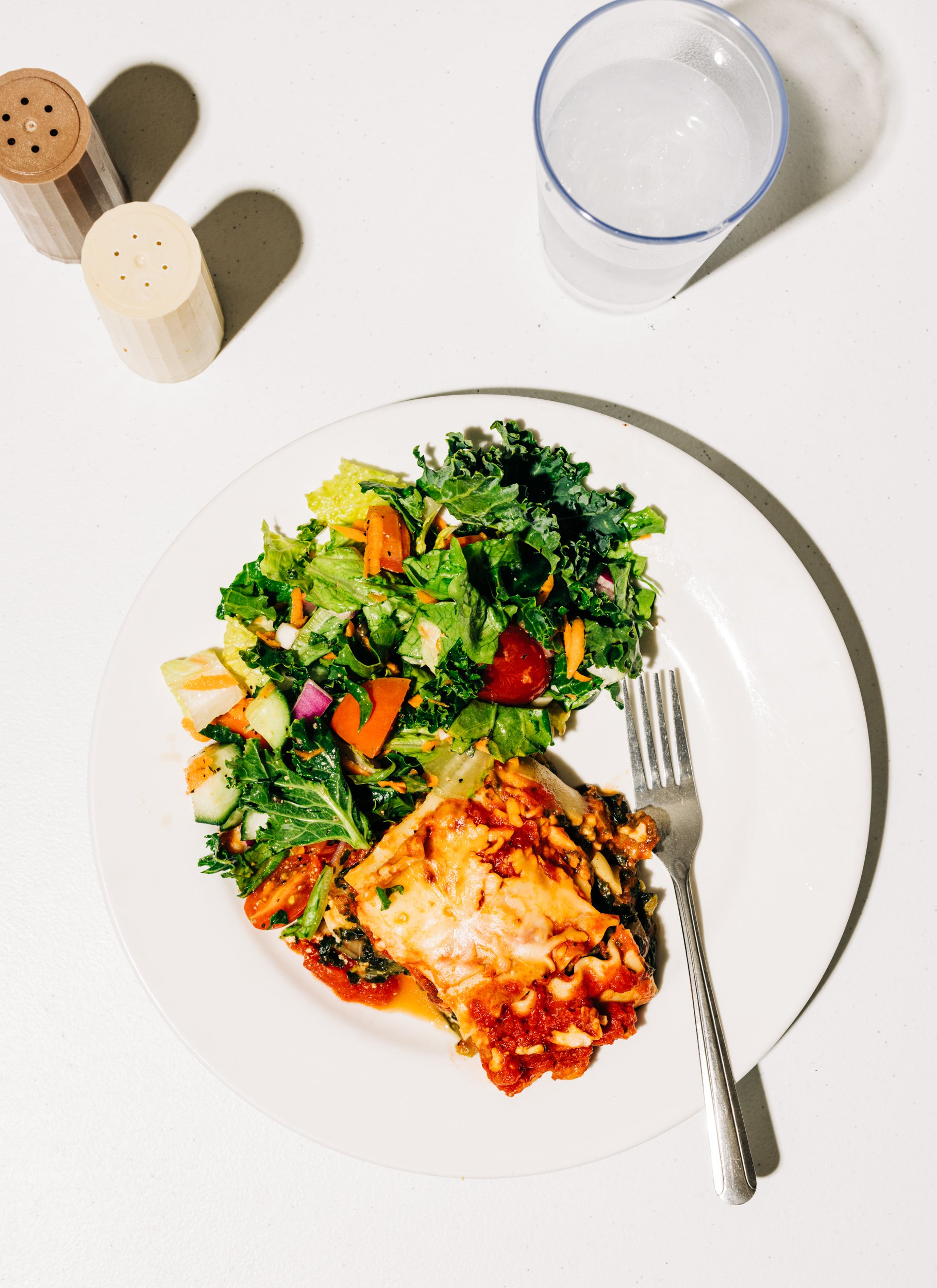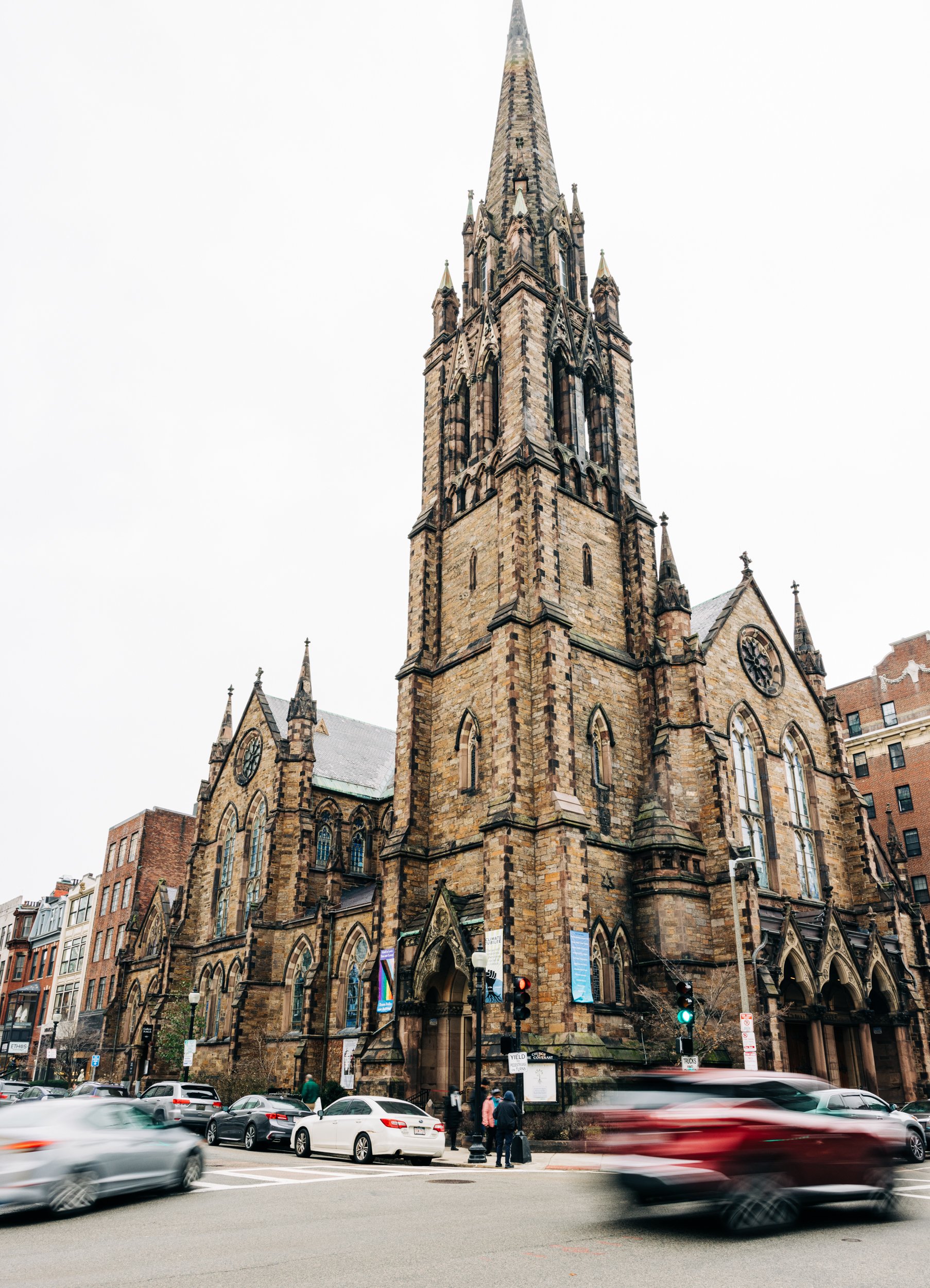Women’s Lunch Place
Photos by Michael Piazza
“You can’t worry about other things while you’re hungry,” says Nancy Armstrong, senior program director of the Women’s Lunch Place in Boston. “We start with hospitality and food, then we can move on to help with other things such as housing or domestic violence.”
For 40 years, the Women’s Lunch Place has welcomed women for lunch in the basement of the Church of the Covenant at 67 Newbury Street in Boston, no questions asked. Now over 1,800 women come to the Women’s Lunch Place each year, many of them suffering from mental or physical health ailments or experiencing a drug or alcohol use disorder; most have a history of domestic violence. The majority of guests are women of color and more than half are over 55 years old.
The food is so good that word of mouth is the number one way that women learn about the free meals, and the need is growing. In 2021, when The Greater Boston Food Bank estimated that one third of Massachusetts adults experienced food insecurity, the Women’s Lunch Place served the highest number of meals they’d ever served: 111,000 meals, a 9.74% increase from the year before.
Six days a week the kitchen makes enough breakfast to serve 170 people and enough lunch to serve 300, including those dining onsite plus takeaway meals and meals delivered to community centers in Boston. All meals are prepared in a scratch kitchen and include healthy grains, lean proteins, fresh fruit and vegetables and always a vegetarian option, whether the main meal is beef chili, tacos, lentil-stuffed acorn squash, baked cod or chicken pot pie.
In addition to meals, the Women’s Lunch Place offers showers, laundry, on-site medical care (through the Boston Healthcare for the Homeless Program) and counseling, art and wellness activities and therapy groups. There is a reading room, a resource room with computers, a library and an advocacy team ready to help guests navigate issues, from getting a Charlie- Card to finding a job to dealing with emotional trauma or finding a place to live, as well as a mailing address for those who need one.
Doors open at 7am Monday through Saturday when volunteers and staff make coffee and begin getting breakfast ready, buttering bread, scrambling eggs and infusing water with fresh fruit.
While Monday’s breakfasts are simple and include items that don’t need much prep, like hard-boiled eggs, bagels, yogurt, cottage cheese and fruit, on other mornings breakfast might include French toast casserole, a breakfast burrito or a garden frittata, toast and fruit salad. Every day there is all-you-caneat hot cereal, whether it’s oatmeal, Cream of Wheat or grits. By 11am, breakfast is cleaned up and lunch is being prepped.
I worked beside Chef Inna Khitrik and another volunteer one Wednesday in late November, helping to make spinach and mushroom lasagna for the next day’s lunch. Wearing aprons, gloves and hair nets, we layered noodles in large pans with tomato sauce, bechamel sauce, ricotta cheese, sautéed vegetables and grated mozzarella and cheddar cheese. While we were cooking, other volunteers were getting that day’s meal ready to serve.
“It gives me so much joy being here and serving our guests,” says Pouran Ghassemi, who has volunteered at the Women’s Lunch Place since 2016. Ghassemi knows many guests by their first names. “I know about their lives and a few know about mine,” she says, adding that the Women’s Lunch Place has a great community of staff who are caring and supportive of each other.
At noon, I helped serve lunch: pasta Bolognese, a fresh green and tomato salad and garlic bread. Guests seated at tables in the dining room were asked their preference of beef or vegetarian, then china plates were heaped with food and brought directly to them. Once they were served, additional guests were served from the tray line. “The food here is better than any restaurant,” one guest told me with a big smile.
After accepting the position of assistant kitchen manager for the Women’s Lunch Place, Khitrik went on vacation. When she started the job three weeks later, in early November 2022, she learned that Sherry Hughes, the Women’s Lunch Place’s head chef for seven years, had moved on (Hughes is now chef at Project Bread).
“The first day when I came in, I’m managing the kitchen,” Khitrik says. She listened to staff and guests and began cooking, creating menus with dishes to please the guests and with recipes the staff would like to cook, expanding her repertoire from Russian, Italian and Mediterranean cooking to Mexican, Jamaican and Colombian. “I see what people like,” Khitrik says.
In December she added a daily soup cart with soups like minestrone; split pea; kale, sweet potato and bean; and winter squash and pumpkin filling a big pot. With soups you can create something with what you have, Khitrik says. “It’s a great way to utilize food donations.” “We want to make food that’s familiar to people, healthy and fresh,” Armstrong says. The Women’s Lunch Place is a member of Food is Medicine Massachusetts and will be working with Advisory Member Dr. Josiemer Mattei, an associate professor of nutrition at the Department of Nutrition, Harvard T.H. Chan School of Public Health, to develop a pilot program to show the impact of alleviating food insecurity through culturally diverse food.
Having a “cultural café” will allow guests to experience access to healthy food they recognize, Armstrong says. Khitrik has made stuffed cabbage, a volunteer from Jamaica made a meal of jerk chicken and beans and a guest from Ghana has a ground nut stew recipe she wants to share. When the soup offering was borscht, guests learned that Khitrik speaks Russian and began seeking her out to practice speaking the language and for help with translations.
For ingredients, the Women’s Lunch Place partners with organizations like Lovin’ Spoonfuls and The Greater Boston Food Bank and recently started partnerships with Boston Vegan in Newton (for plantbased meat products) and with Captain Marden’s Seafood in Wellesley. The fish is now fresher and less expensive than when they were sourcing seafood from Sysco, Armstrong says, and guests have noticed the difference.
Iggy’s donates bread to the Women’s Lunch Place and in the summer and fall Gaining Ground provides fresh greens. Friends bring in vegetables and herbs from their gardens or extra fish they’ve caught, and Armstrong says, “We make use of it all.”
The Women’s Lunch Place has a garden club. Volunteers and guests tend herbs seasonally in a small garden just outside the door on Newbury Street and vegetables in a garden plot at The Food Project’s Dudley Greenhouse in Dorchester. Wellness Program Navigator Stacey Zellen says that in January they harvested the greenhouse crop and bagged everything up for guests, pairing each vegetable with a printed recipe.
“We get the guests involved whenever we can,” Armstrong says. Guests are taken on field trips to places like Gaining Ground’s farm in Concord as well as to local farmers markets where they are taught how to use SNAP (the federal Supplemental Nutrition Assistance Program) so they can learn how to eat healthy and fresh and not processed food.
According to Armstrong, there are many people who don’t know where food comes from and Zellen says they are working on having sustainable cooking classes that are greenhouse and SNAP friendly. “When they help grow it, they see it, they taste it, and they will try things they haven’t tried before,” Armstrong says.
This year the Women’s Lunch Place will also be growing herbs and flowers on the corner of Berkeley and Newbury Streets. “We want to take all these urban spaces that are ugly and concrete and turn them into places where people can find food right in their backyard.' Armstrong says.
“Our shelter is well known for the wonderful food we provide,” Armstrong says, adding that Victory Connector, a Boston nonprofit located in the Mass and Cass area, uses the Women’s Lunch Place food to tempt unhoused people into their facility to learn about their services. “We pack boxes with delicious meals, including vegetarian options, for this wonderful program that has no cooking facilities,” Armstrong says.
They provide a daily dinner service for approximately 65 families at St. Mary’s Center for Women and Children in Dorchester and bring takeaway meals to Beacon Communities in Boston and the Church of Christ in Roxbury (which are then distributed to the elderly and those at private domestic violence shelters). During COVID, the Women’s Lunch Place delivered meals to the Charles River Inn in Brighton where St. Francis House provides overnight housing for people who need it.
With an increase in substance use disorder and more complex mental health problems, guests’ needs have changed in the years since the Women’s Lunch Place began serving meals.
“Food is what brings people in,” Armstrong says. “Once you alleviate food insecurity you can worry about other stuff.”

